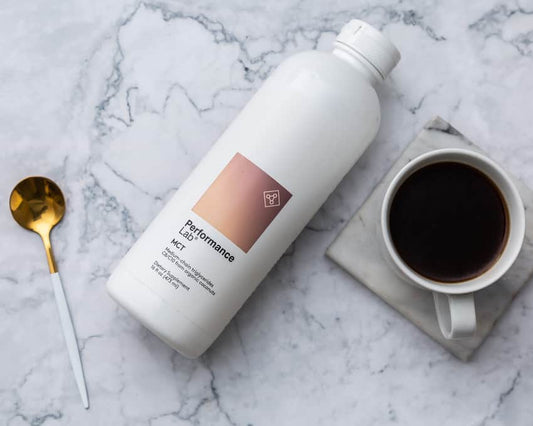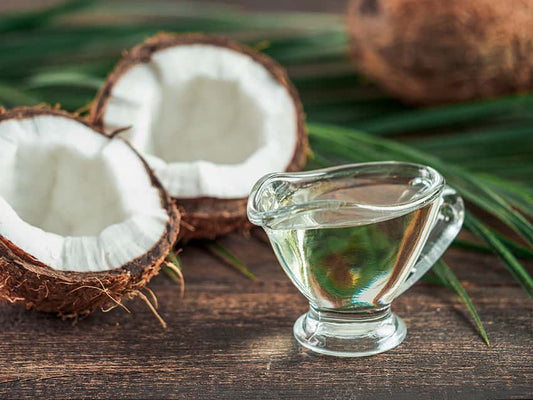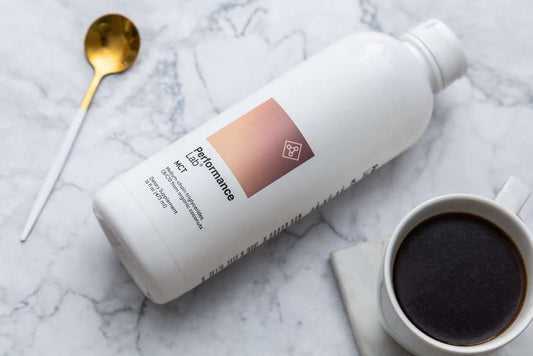MCT oil is taking the fitness world by storm, which is no surprise considering the significant benefits it can have on your athletic performance.
When taken before a workout, MCT oil gives you that extra bit of energy that can help you crank it up a notch in the gym.
But a question that's been on many people's lips lately is - does MCT oil have caffeine?
The quick answer is no, it doesn't.
But if you'd like to find out more about how combining MCT oil and caffeine can elevate your performance even further, you're in the right place!
What is MCT Oil?
MCT oil contains medium-length chains of fats called triglycerides (MCTs) - hence the name! It is usually extracted from coconut oil, which is found in high concentrations here but can also come from palm oil and some dairy products.
During digestion, fats make their way from the gut to the liver, where they are broken down and either stored as fat or used for energy.
Due to their short chain length, MCTs are more easily absorbed and provide readily available energy. For this reason, MCT oil is a popular supplement amongst athletes and bodybuilders.
MCT oil does not contain caffeine itself but is often added to coffee for enhanced energy and benefits. Let’s take a closer look at how MCT can benefit your athletic performance.
Benefits of MCT Oil
Effective source of energy
MCTs contain fewer carbons in their fatty acid chains than other fats, known as long-chain triglycerides (LCTs), meaning they don't need to be broken down by bile in the liver, like LCTs, and can immediately enter cells to provide an instant energy source shortly after consumption. 1.
People often wonder whether MCT oil provides energy because it contains caffeine. The answer is, no, it doesn’t! It provides a natural energy source that doesn’t possess the same adverse side effects as caffeine, such as energy crashes, jitters, or irritability.
Promote weight loss
MCT oil can aid weight loss in numerous ways. Firstly, it may reduce food consumption by increasing levels of appetite-reducing hormones, peptide YY, and leptin 2.
Secondly, MCTs are much lower in calories than other fats in foods like olive oil, nuts, and avocados.
And lastly, MCT oil promotes the growth of good gut bacteria associated with weight loss and better gut health 3.
Reduce lactic acid
A buildup of lactic acid during exercise causes muscle pain, weakness, and eventually fatigue. One study found that cyclists who consumed 1.5 teaspoons of MCT oil before exercising had better performance and lower lactate levels 4.
MCT Oil and Caffeine
A popular way of consuming MCT oil is to take it alongside caffeine. Although processed differently by the body, both substances can benefit your workouts.

Performance Lab MCT and Caffeine+ complement each other perfectly. When combined, the energy boost and effects on weight loss are more significant than if either were taken individually. Caffeine also provides added benefits to brain function and concentration, for an all-round improved performance.
Conclusion
MCT oil is a source of easily digestible fats that provides the body instant energy. It also supports weight loss by increasing appetite-suppressing hormones, improving gut health, and reducing the build-up of lactic acid in the muscles.
MCT oil does not contain caffeine itself but can be taken in conjunction with caffeine for enhanced effects.
References
- Schönfeld, Peter, and Lech Wojtczak. "Short-and medium-chain fatty acids in energy metabolism: the cellular perspective." Journal of lipid research 57.6 (2016): 943-954.
- St-Onge, Marie-Pierre, et al. "Impact of medium and long chain triglycerides consumption on appetite and food intake in overweight men." European journal of clinical nutrition 68.10 (2014): 1134-1140.
- Rial, Sabri Ahmed, et al. "Gut microbiota and metabolic health: the potential beneficial effects of a medium chain triglyceride diet in obese individuals." Nutrients 8.5 (2016): 281.
- Nosaka, Naohisa, et al. "Effect of ingestion of medium-chain triacylglycerols on moderate-and high-intensity exercise in recreational athletes." Journal of nutritional science and vitaminology 55.2 (2009): 120-125.















